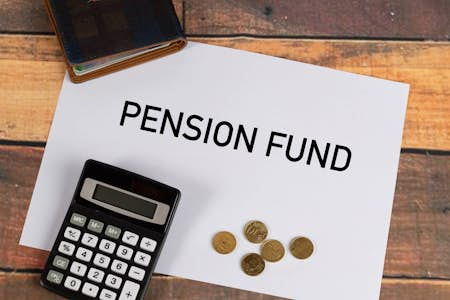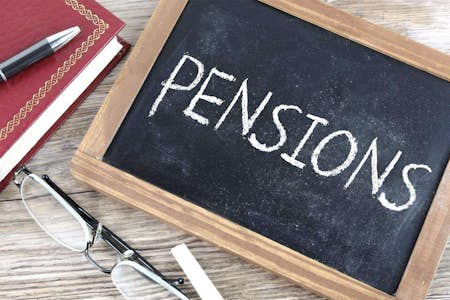We have seen some considerable changes in pension regulations in recent years, not to mention the challenges created by the coronavirus. It is feasible to accumulate several work and private pensions during your working life, on top of your state pension entitlement. Consequently, it is essential to plan your pension contributions, how your pension funds are invested, and be aware of when you can access them.
Maximise your retirement fund with our panel of pension providers. Click on your chosen provider to get started!
How do you plan your pension?
There are several basic steps involved in pension planning which include:
- Discovering your pensions and how much is in them already.
- Working out how much you need to pay into your pension to accumulate a pension pot that will fund your lifestyle in later life.
- Understanding the expected value of your pension.
- How you can withdraw from your pension.
How do I check my pension?
The first step in pension planning is discovering, collating and checking all of your existing pensions. This will give you the foundations to build your retirement planning, allowing you to make changes to contributions and investment strategies when applicable.
You’ll need to find out:
- The details of your past pensions and their value.
- How much you’re paying into your current pension.
Finding a lost pension
Lost pensions that you no longer pay into typically become frozen after some time, often after leaving one job for another. When pensions become frozen will vary depending on the terms and conditions of your pension provider. Frozen pensions, also known as dormant pension pots, should be located and moved or used. Over time they may lose value in relative terms due to fees and a conservative investment policy.
By 2050, there may be as much as £750 billion stagnating in dormant pension pots!
If you fear you have money in a frozen or dormant pension pot, don’t worry, you can regain control. To do that, you’ll have to track down your pensions.
If you can remember your places of work
To find out about your previous and existing pensions, you can contact your employers. This may be straightforward in the case of major companies. You can phone a company’s HR department or try the contact numbers found on any paperwork you have - including your pension statements.
You can also search online. Here is an example; the Kingfisher Pension Scheme covers B&Q and Screwfix employees in the UK. So if you worked for this company but didn’t know the details of your pension, you can head to their website, where they then direct you to a service named PensionsLink.
At PensionsLink, you’ll insert your National Insurance Number, and you should be able to locate the details of your pension(s). PensionsLink and FindMyLostPension are two leading pension tracking services for UK workplace pension schemes.
If you cannot remember your places of work
If you want to trace your pension from scratch, you can use the government’s Pension Tracing Service, available both by phone and as an online tool. If you worked in the public sector and believe you have a public sector pension, you can use the Pension Tracing Service and check with the organisation for which you worked.
For example, NHS workers can find pension resources on the NHS pensions site.
What’s next? Transferring and combining your pensions
If you’ve already reached retirement age, you can take money from your newly discovered pensions immediately. However, if you haven’t reached retirement age, it may be an idea to consolidate old pensions into a new or existing fund. It would be sensible to take professional advice in this scenario.
You can pool old pensions into your current defined contribution workplace pension or move them into a new or existing personal pension or SIPP. There will usually be some form of exit fee when moving pension funds. Still, it may make financial sense if you’re being charged exorbitant fees on an inactive or conservatively invested pension fund.
It’s important to remember that pension schemes often include certain guarantees and other benefits you can lose if you transfer out. For that reason, the law requires you to seek independent financial advice before transferring or combining pensions exceeding £30,000 in value.
Many providers allow you to combine pensions into one new pension. You may also be able to transfer old pensions to your current workplace pension.
What is a good pension pot?
Answering “what is a good pension pot” is a bit like answering “how long is a piece of string?”
The main difficulty is that we don’t know how long we’ll live, although life expectancy in the UK has risen sharply. According to Aviva, a 65-year-old male retiree will probably live until 84. A woman will, on average, live until 86. Our chances of living even longer have also increased dramatically. A 65-year-old man now has a 9% chance of reaching 100, and a woman has a 14% chance.
This means the minimum expected retirement duration is over 20 years. The maximum is more like 35 years, or longer if you retire before 65. Consequently, it is even more important to undertake some pension planning as soon as possible.
The longer you live, the more pension you’ll require.
If you have a defined contribution pension (either workplace or personal), the value of your pension on retirement will depend on:
- How much you’ve paid into your pension.
- How well your investments have performed.
- Any pension fees you’re paying.
Though you cannot predict how long you’ll live, you can predict how long your pension pot will last you.
How much do I need for a good pension?
In 2019 and 2020, Department for Work & Pensions stats showed that the average pensioner receives between £17,000 and £18,000 a year from their pensions - after tax and housing costs are considered. Housing costs exclude energy costs but include:
- Rent
- Water bills
- Insurance
- Mortgage interest payments
- Ground rent
Between £17,000 and £18,000 per year works out as a weekly income of between £310 and £340.
Pension Wise has an excellent calculator for calculating your potential lump sum and monthly income. For example, a pension pot of £250,000 would allow you to take a 25% tax-free lump sum of £62,500 when you’re 65, providing a £1,050 monthly income until you’re 85.
How much should I save for my pension?
The best way to demonstrate how much you should save for your pension is to work through an example.
Which? data found that retirees spend around £26,000 per couple each year on average. This covered everything from household and basic living costs to a standard holiday and additional leisure costs. The figure of £26,000 is broadly aligned to the national average retiree income found by the DWP, excluding state pensions.
Let us examine how you achieve a retirement income of £13,000 to cover your share of annual expenditure. If you start at the age of 30 with a small pension pot of £500, you would have to contribute £506 gross a month. This figure includes government tax relief of 25% on pension contributions – the net figure is £379.
This calculation assumes the following variables:
- Retirement age of 65
- Average annual investment return of 5%
This equates to a pension pot on retirement of £462,064, which, assuming inflation of 2% per annum, is the equivalent of £231,045 in today’s money. These figures are based on using Money Farm’s pension calculator, with figures correct as of 24th May 2021.
This is an example of one person paying into a defined contribution (otherwise known as money purchase) pension entirely from their own money, without taking a tax-free lump sum when they’re 65.
Note, this example doesn’t take salary contributions or tax relief into account, nor does it factor in the state pension (with the state pension age set to change in the coming years).
How much to put into your pension pot
Remember that your pension may not be your only source of retirement income. You may also have a property (equity release may be an option to raise funds), other assets or savings in ISA accounts. In addition, more people are also looking to take up a part-time job in their retirement. Consequently, you may also find yourself accumulating greater wealth later in life from employment, promotions or inheritance.
If your budget is tight now, for example, you may have credit card debt, you should still try to contribute something to your pension. Even a tokenistic amount each month - say £50 - can accumulate a small pot on which to build from later in life.
If you pay into a workplace pension, your employer will match your contributions up to a certain amount, and you’ll also get tax relief. Employer contributions - a minimum of 3% of your salary - are funds you wouldn’t see otherwise. This often means that long-term full-time employees will accrue more than they expect in their pension pots. For many people, this is the most efficient way of building their pension pot.
Using pension calculators
There are many pension calculators that you can find online, which will help you forecast future income. You can also investigate any income adjustments according to changes in your contributions. Some of the more popular pension calculators include:
- Pension Wise
- The Money Advice Service
- Pension Bee’s calculator
- Nutmeg
The beauty of these calculators is their simplicity; they are very useful!
Where can I find pension advice?
If you’re stuck or confused when considering your pension options, remember there is a vast range of pension resources available in the UK. Some popular pension resources include:
- Money Advice Service
- Pensions Advisory Service
- Age UK
- Money.co.uk
- Pension Wise - offer a free pension guidance session to the over-50s
- Which?
- Money Saving Expert
- Good With Money
- Unbiased
You should also include your pension assets and contributions as part of your annual financial review with your financial adviser. The provision of financial advice is regulated by the Financial Conduct Authority, offering individuals a degree of protection against scams.
When to get pensions advice
Pensions are not straightforward, hence why we created this guide and why you’re reading it!
This guide in no way replaces the independent financial advice you should seek regarding your finances/pension assets, but it offers a handy insight. You may be considering:
- Pension transfer
- Starting a new pension
- Increasing your contributions
- Planning for the future
Pension Wise or the Pensions Advisory Service can be an excellent first port of call for relatively simple queries. They will often be able to help. If not, they can point you in the right direction for professional financial guidance.
You will also find that many large businesses and organisations within the private and public sectors will have access to their own pension advisors. You can contact them directly for details and advice on workplace pensions.
Remember, if you wish to transfer a defined-benefit pension exceeding £30,000 in value, you must consult an independent financial advisor.
Should I consider an ISA over a pension?
An ISA is an Individual Savings Account with tax benefits for long-term savings. People often ask whether they can substitute a pension with an ISA. However, while they both have tax benefits, they are very different financial animals.
ISAs differ from pensions in terms of their accessibility, limits, tax relief, inheritance and other rules. Therefore, it is essential to speak to a financial adviser when comparing and contrasting the benefits of pensions and ISAs.
ISAs vs Pensions
An ISA is a long-term savings account. It allows you to save money without paying tax on the interest you earn. ISAs allow you to pay in a yearly sum of £20,000, but this is subject to change.
Depending on the type of ISA, you can usually withdraw funds when you need them. However, you may be limited to a specific number of withdrawals for a fixed-term ISA, and you might be charged for making them.
In contrast, pensions are designed with even longer-term saving goals in mind. The accumulation of contributions, together with investment returns and tax relief, can lead to significant capital appreciation. Even though the ability to reclaim dividend tax deductions was removed some time ago, all capital gains within a pension are shielded from tax.
Deciding whether to pay into a pension or an ISA
ISAs are more readily accessible than pensions and provide a more flexible way to save earlier in life. There’s a vast selection of ISAs available divided broadly into fixed-rate ISAs and EasyAccess or Cash ISAs. However, this should not necessarily be seen as a replacement for pensions.
Your financial situation may warrant a split of your investments/savings between an ISA and a pension. Traditionally pension assets are not available until a minimum age of 55. ISA savings tend to be more accessible depending on the type of account.
Tax relief with ISAs and pensions
While tax relief and various allowances regarding pension contributions and ISA savings can vary from time to time, at the moment, the situation is as follows:
Pensions
Pensions come with income tax refunds/tax relief. These are payable at your income tax rate up to an allowance of £40,000. For a UK taxpayer in the tax year 2021/22, you’ll get tax relief on pension contributions of up to 100% of your earnings or a £40,000 annual allowance, whichever is lower.
This effectively acts as a government bonus for paying into your pension - with a minimum value of 20%. So instead of paying income tax on your pension contributions, the government throws in the value you would have paid to them.
ISAs
There’s no such contribution-based tax relief when it comes to ISAs. However, you won’t pay tax on the interest you earn from your ISA. Also, the interest earned from an ISA doesn’t contribute to your personal savings allowance (PSA).
Potential returns
The potential returns from pension and ISA investments will vary depending upon the performance of the underlying assets. However, in theory, the range of options available to these two financial vehicles is very similar.
Pensions
Defined contribution pension plans offer a wide range of investment options. In the case of SIPPs, you can choose from an array of managed funds, or individual assets, that best suit your desired risk profile. This provides more control over your investments, whether managed by a third party or self-managed. However, while there is potential for long-term capital gains, this is not guaranteed. It is also important to note that different types of pension plans may be more restrictive in the range of investments available to you.
That said, most pension funds are well-designed for stable, long-term growth and are diversified across a range of assets to reduce risk. This can help negate the impact of short-term market fluctuations.
ISAs
Stocks and shares ISAs allow you to invest your money in funds, bonds and company shares. These are often curated or hand-picked with different profiles, e.g. low risk for long-term savings or high-risk for more volatile short-term investments.
Stocks and shares ISAs are one way to earn more interest on your money than in a standard bank account.
Withdrawing your money
As we touched on above, there are significant differences regarding accessibility when it comes to pensions and ISAs.
Pensions
You can’t access a pension before the age of 55 (rising to 57 in 2028) except in some exceptional circumstances (e.g. terminal illness).
When you do reach 55, you have a few options for withdrawal. First, you can immediately take 25% as a tax-free lump sum. Alternatively, you can leave your money invested and withdraw periodically (drawdown) or buy an annuity (a guaranteed income).
ISAs
All ISAs allow you to access your funds at any time, although some may include financial penalties. For example, fixed-rate ISAs lock your money away for a fixed period and come with terms and conditions that penalise you for an early exit or withdrawal.
Flexible ISAs, Cash ISAs or Easy Access ISAs do not have fixed-term conditions, and you can access them at any time.
Inheritance
Inheritance tax planning should be part of your annual financial review. You must be aware of various allowances and taxes on your death. Long-term inheritance tax planning could significantly reduce a potential inheritance tax charge. This means that most of your assets will go to your chosen beneficiaries.
Pensions
If you die before the age of 75 with a defined contribution pension, your pension can be passed onto your beneficiaries tax-free. If you die after 75, beneficiaries will have to pay income tax on the value of any pension you’ve left them.
ISAs
ISA savings count as part of your estate, accumulated together with other savings, on which your beneficiaries may have to pay inheritance tax. However, ISAs passed onto spouses or civil partners retain their tax benefits.
Everything you need to know about pension planning
For many people, confusion arises when trying to work out how much pension they’ll require and what they need to save to get them over the line for a happy retirement.
Remember, you may have more of a pension than you think.
You’ll also need to factor in the state pension if you qualify - remember to monitor the latest news on rates and changes to retirement age.
Don’t discount the value of your other assets, like your house, when you retire!







